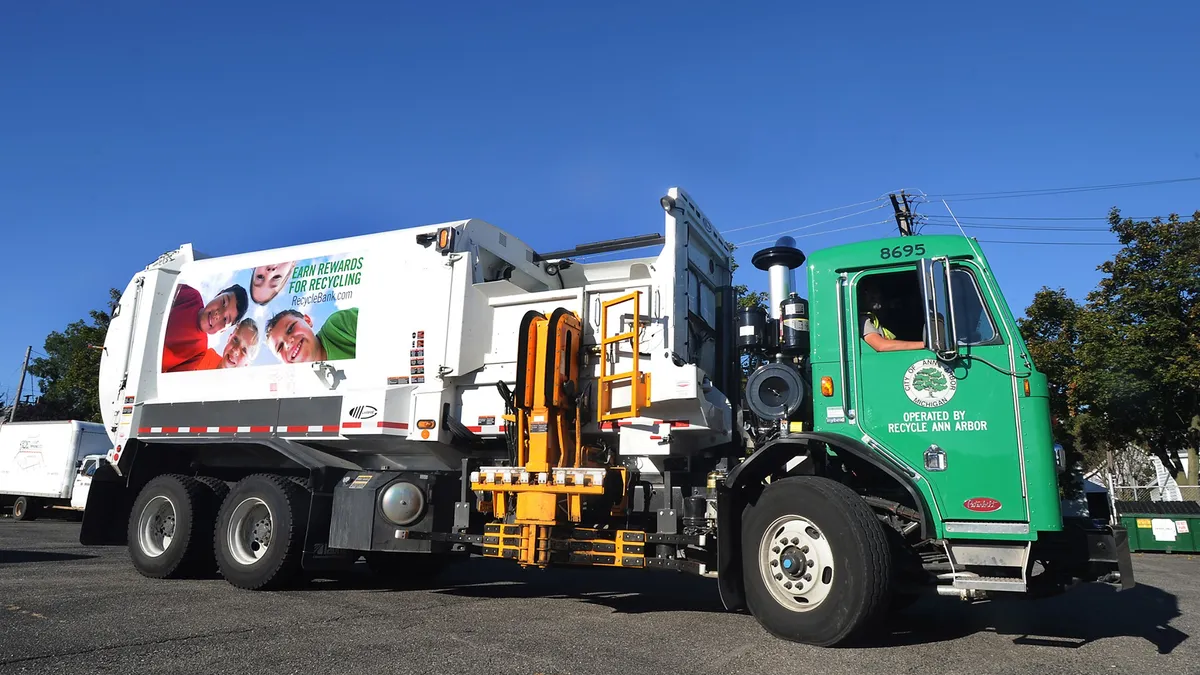UPDATE: July 22, 2020: This week, the Ann Arbor City Council unanimously approved a 10-year lease and operating contract for nonprofit Recycle Ann Arbor to reopen the city's dormant MRF. Officials estimate this will save the city $250,000 to $500,000 annually according to MLive.
The deal includes plans for a capital investment exceeding $5 million in new equipment for the facility, including glass sorting technology, supplemented by an $800,000 state grant according to Recycle Ann Arbor. Construction is expected to begin in early August and last for approximately one year.
Dive Brief:
- December 2019: Ann Arbor City Council recently voted in favor of reopening the Michigan city's MRF, which idled in 2016. The council instructed city staff to negotiate an agreement with nonprofit Recycle Ann Arbor (RAA) to rebuild and operate the MRF for an initial period of 10 years.
- The move went against a staff recommendation to approve a five-year contract for Emterra Environmental USA to process recyclables about 65 miles away at a planned MRF in Lansing. Instead, the council approved a substitute resolution to pursue RAA's proposal for reinvesting in the MRF. RAA's current hauling contract, which is set to expire in June 2020, involves transporting recyclables about 250 miles away to Cincinnati, Ohio.
- The city declined to discuss any details about next steps during negotiations. According to RAA CEO Bryan Ukena, it might take about a month to develop the new contract. A city spokesperson stated no discussions on timing have occurred yet. Ukena told Waste Dive it could take about a year to add new equipment once terms are finalized. "We're a community-based recycler and we've been wanting this for a long time. This really does represent to us a cornerstone for our recycling program."
Dive Insight:
Environmental groups and members of the Ann Arbor community have been pushing to re-localize recycling since the MRF idled in 2016, Ukena said. Citizens — including the city's former recycling and solid waste coordinator — voiced their support at a Monday council meeting for re-opening the MRF instead of transporting recyclables to Lansing. RAA also received support from the Michigan Recycling Coalition, as well as nonprofit MRF operators Eureka Recycling and Eco-Cycle, ahead of the meeting.
But not everyone favored the amendment to refurbish the MRF, and council members debated the issue at length. Council Member Jane Lumm raised numerous concerns, arguing that approving the amendment and going back on city staff's recommendation violated the principles of competitive bidding. She also asserted refurbishing the MRF is costly and RAA lacks the experience to operate such a facility, increasing risk.
A representative from Emterra also spoke at the meeting, making a case for the the larger company's capabilities to access end markets and other potential benefits. Emterra did not respond to a request for comment after the vote.
Ann Arbor's MRF was built in the mid-1990s and those on both sides of the debate agree that the equipment is outdated and, in some cases, unsafe. That was reportedly a leading reason the city shuttered the facility three years ago, canceling a contract with ReCommunity at the time. RAA has proposed $5.1 million in upgrades that include removing the old equipment, refurbishing elements such as conveyors where possible and adding new, state-of-the-art machinery. Machinex would help to design the facility and RAA would construct it, Ukena said.
Although the upfront investment is significant, it makes sense in the long run to sort recyclables locally, Ukena said, because the current model of transferring materials from Ann Arbor to Cincinnati is a "very expensive situation." RAA proposed to the city that the nonprofit would continue transloading material to a different MRF about 40 miles away, outside of Detroit, for approximately a year during construction.
Ann Arbor's situation bears similarities to what recently occurred in Santa Fe, New Mexico. Santa Fe's local waste management agency recently entered a contract with a new operator to re-open the municipal MRF that idled in 2015. The city recognized that shipping curbside recyclables 65 miles away to Albuquerque for sorting had grown expensive under modern conditions. As is the case in Santa Fe, re-opening Ann Arbor's MRF also will create local jobs. RAA anticipates hiring nearly two dozen full-time union workers with benefits.
Once the MRF becomes operational, RAA will start by collecting the same materials accepted under the current curbside program. But upgrades and modern sorting technology hold the potential for expanding the stream in the future, Ukena said. However, that would entail RAA locating adequate workarounds to compensate for Ann Arbor's smaller facility. The site will also be designed with the intent to potentially add robotics in the future.
Seeing the community support for reopening the MRF at the council meeting was heartening, Ukena said.
"This is a very local project," he said. "To see them say we want the MRF fixed, and we want to recycle stuff here, and we love community-based recycling, and we see Recycling Ann Arbor as part of the "zero waste" approach... It's very exciting."
Correction: A previous version of this article described RAA's proposal as unsolicited. RAA's initial April proposal to re-open and operate the MRF was unsolicited. The second proposal, which the council approved, was in response to a September RFP.















